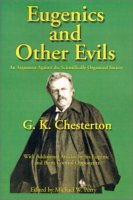
Eugenics and Other Evils: An Argument Against the Scientifically Organized State, by G. K. Chesterton. With Additional Articles by His Eugenic and Birth Control Opponents, including Francis Galton, C. W. Saleeby and Marie Stopes, as Well as Articles from Eugenics Review and Birth Control News. Edited by Michael W. Perry. (Inkling Books, Seattle, 2000)
In a day when our political views are more polarized than ever, and we tend to choose and judge what we read or watch by its political and social slant, there's a delightful keenness about a book that cannot be so classified. It is simultaneously far right and far left, which means nothing more than it is something else altogether.
Eugenics and Other Evils was first published shortly after World War I, though most of the material was written before the war. Lest you think it a quaint relic of a bygone era, tilting at windmills that no longer exist: if the name "eugenics" has been justly disposed of, the ideas and arrogance behind the movement are with us in many forms and guises.
Although I recommend Chesterton's book wholeheartedly, I've been debating whether or not to recommend this particular edition. The editor's comments can be annoying, and his habit of disrupting the flow of Chesterton's prose with pull-quotes even more so. Nonetheless, he does provide important context information, without which the topical references would be even more confusing. To quote from the introduction,
Why have I chosen to devote a quarter of this book to the writings of his opponents? Because I want Chesterton to get proper credit for his great achievement. He wrote in the heat of battle, when the debate over eugenics was at its fiercest.... [N]o scholar alive has done as much to expose that strange blend of silliness, scientific bigotry and politically correct arrogance which once went by the proud name of eugenics.... [A]s a writer he stood virtually alone against a juggernaut that threatened to sweep all before it. In 1924, a eugenist could speak proudly of a scholarly bibliography listing thousands of articles on eugenic-related topics. Today, eugenics has few open friends (though many secret admirers). But when Chesterton wrote its ranks were a [virtual] "who's who" of the respectable and powerful. Apart from him, almost no one of importance spoke out against it.
From the book itself I cannot quote. After affixing the 15th sticky note to mark a passage worth sharing—from a book of only 119 pages, pull-quotes and all—I stopped keeping track and despaired of choosing. Eugenics may be the substrate, but Chesterton brings forth wise commentary on industrial capitalism, socialism, anarchy, slavery, the loss of common sense in the legal system, how a downtrodden medieval serf might be considered more free than a homeless man in modern England, why a poor thief wants his victims to be rich but a rich thief wants his victims to be poor, the tyranny of social reform movements that begin by taking away a man's ale and do not stop with taking away his wife, how "science" became an oppressive state religion, and even the contrasting effects of alcohol on European Catholics and Scottish Protestants.
I was wrong; there is one quotation I can't resist sharing, the first paragraph of the first chapter:
The wisest thing in the world is to cry out before you are hurt. It is no good to cry out after you are hurt; especially after you are mortally hurt. People talk about the impatience of the populace; but sound historians know that most tyrannies have been possible because men moved too late. It is often essential to resist a tyranny before it exists. It is no answer to say, with a distant optimism, that the scheme is only in the air. A blow from a hatchet can only be parried while it is in the air.
Ken Robinson's The Element contains the following relevant quote:
[Lewis] Terman [father of the Stanford-Binet IQ test] was an active player in one of the darker stages of education and public policy, one there is a good chance you are unaware of because most historians choose to leave it unmentioned, the way they might a crazy aunt or an unfortunate drinking incident in college. The eugenics movement sought to weed out entire sectors of the population by arguing that such traits as criminality and pauperism were hereditary, and that it was possible to identify those traits through intelligence testing. Perhaps most appalling among the movement’s claims was the notion that entire ethnic groups, including southern Europeans, Jews, Africans, and Latinos fell into such categories. “The fact that one meets this type with such frequency among Indians, Mexicans, and Negroes suggests quite forcibly that the whole question of racial differences in mental traits will have to be taken up anew and by experimental methods,” Terman wrote.
“Children of this group should be segregated in special classes and be given instruction which is concrete and practical. They cannot master, but they can often be made efficient workers, able to look out for themselves. There is no possibility at present of convincing society that they should not be allowed to reproduce, although from a eugenic point of view they constitute a grave problem because of their unusually prolific breeding.”
The movement actually succeeded in lobbying for the passage of involuntary sterilization laws in thirty American states. This meant that the state could neuter people who fell below a particular IQ without their having any say in the matter. [The laws were eventually repealed.]
Excerpt: Weapons of Mass Instruction: A Schoolteacher's Journey through the Dark World of Compulsory Schooling, by John Taylor Gatto (New Society Publishers, Gabriola Island, BC, Canada, 2009) A pastor I know was fond of quoting Martin Luther, who, ...
Weblog: Lift Up Your Hearts!
Date: February 14, 2010, 7:06 am


